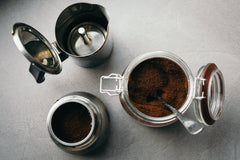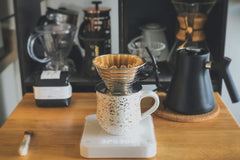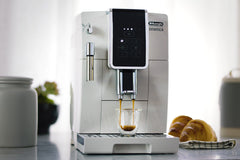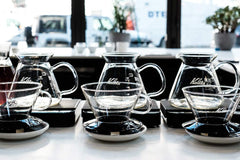When the sun is shining, there is nothing better than opening the refrigerator and pouring yourself a glass of cold brew.
That is until your cold brew starts tasting off!
So, how long does cold brew last? And, are there any tips for keeping it fresh?
Read on to discover everything you need to know.
Table of Contents
What is cold brew vs iced coffee?
The main difference between cold brew vs. iced coffee is cold brew never comes into contact with hot water. You make cold brew by soaking coffee beans in normal water or refrigerated water for more than 12 hours.
This process helps in terms of extracting caffeine, sugars, and oils. On the other hand, iced coffee is simply traditional coffee that is then poured on top of ice cubes to make it cold.
Experts have indicated that this extraction method makes cold brew less toxic.
Some experts also believe that high antioxidant activity is exhibited by cold brew coffee, meaning it can help to prevent a number of diseases.
Because of these benefits and the delicious flavor, more and more people are drinking cold brew. It is seen as a tasty and healthy alternative to artificially sweetened drinks, especially soda and sugary pre-made ice coffees.
Another key benefit associated with cold brew is that it can be stored for a lot longer than hot coffee, which is something we will discuss in more detail in this post.
However, this makes it a convenient drink, as you can simply open the fridge and grab yourself a glass whenever you are in need of a caffeine kick.
Do I need to store my cold brew in the refrigerator?
Yes! It’s all in the name; you have got to keep it cold, and this means storing it in the fridge. If your cold brew coffee is left at room temperature once you have finished brewing, it will spoil within a matter of hours.
It can be dangerous to leave even a cup of coffee out on the side. Every time the coffee is out of the refrigerator, the freshness will depreciate quicker.
This is why it is critical to store the cold brew in your fridge as much as possible.
I don’t have any room for the brewer in my fridge? Does it need to brew in there?

If you have read the instructions on your cold brew maker, we are sure you will have noticed that you are instructed to put the cold brewer in the fridge while it is brewing.
Room temperature will be fine during the cold brewing process, so don’t worry. We know that not everyone has space in their fridge for a bulky cold brew maker.
However, as soon as the coffee has finished filtering, do make sure you put it in your refrigerator as soon as possible.
One other option you may want to consider is getting a bowl and creating an ice bath, placing your brewer inside of this, as this will expedite the cooling process considerably.
Can cold brew go bad?
Just like any beverage or edible food, cold brew can spoil. Even if you keep it in the fridge, it will eventually break down at that temperature. After all, nothing stays fresh forever. The taste will change as time goes on. So, if you are only likely to drink a small amount of cold brew, adjust the quantity you make to suit this.
As is the case with using coffee beans for brewing, the fresher, the better. Sure, leftover coffee can be stored in the fridge, but I don’t advise making it a habit.
Some of the signs your cold brew has gone bad
- Rancid or mold smell
- Extremely acidic taste
- Noticeably less flavor
- The caffeine kick has disappeared
- Little aroma
How long does cold brew last once you have made it?
Cold-brew should last between seven and 10 days, so long as you refrigerate it.
One of the key benefits associated with cold brew is that it lasts a lot longer when compared with regular hot coffee. Also, did you know that the flavor of hot coffee tends to degrade around half an hour after the water touches the ground coffee beans?
The same can be said for iced coffee, as it is simply hot coffee that has been cold down. Cold brew, on the other hand, keeps much better. It has much higher flavor stability.
However, if the flavor starts to taste a bit off, you’d be better off making yourself a fresh batch and feeding it to your plants instead.
I am not joking either. Dilute it with two parts water, and one part cold brew. You can water plants that have a preference for soil that is slightly acidic, such as ferns, begonias, and roses.
Of course, I am not suggesting you drown your plants in cold brew every day.
Cold brew timetable
Here is what to expect from your cold brew over the period of a month:
- Day 1 - Your cold brew is fresh
- Day 3 - The diluted concentrate will begin getting stale
- Day 7 - The concentrate will start tasting stale
- Day 14 - Your plants should definitely be enjoying your cold brew by now, as it will taste sour, sharp, and bad
- After this, say hello to mold! No thank you!
How long should I let my cold brew steep?
This all depends on whether you are brewing in the fridge or at room temperature.
An optimal time to let your cold brew steep at room temperature is 16 hours, but don’t panic; you do not need to get it down to pinpoint accuracy.
Anywhere from around 14 to 18 hours will be just fine. A lot of people tend to make it in the evening and then do a taste test once they wake up. After all, a lot of it comes down to your own preferences and how strong you want the coffee to be.
However, one thing I wouldn’t do is leave your coffee to brew for more than 20 hours. If you start getting in the 24-hour range, you will experience some woody notes that are not very pleasant.
If you want more of a stronger and bolder profile, simply dilute a little bit more rather than steeping the coffee for longer.
If you do steep your coffee in your fridge, though, a long steep of around 20 hours will be ideal.
How can you extend the shelf life of your cold brew?
The best way to extend the freshness of your cold brew is to store it correctly. You can keep it in plastic or glass, yet the latter is the best option.
Why?
Well, plastic is porous, so vital flavors can end up becoming oxidized at a quicker rate. Furthermore, some of the chemicals found in the plastic impact the taste of the coffee.
With glass, you do not have to worry about any chemicals interacting with flavor profiles. You can also seal glass containers tighter.
Coffee press beakers and mason jars are both excellent choices for fridge storage.
Will sugar, cream, or milk impact the shelf life of cold brew?
If anything is added to your cold brew concentrate, such as milk, cream, sweetener, or even plain water, the shelf life of your cold brew will decrease.
The best practice is to store the cold brew concentrate and simply add anything you need to your glass when you are ready to drink. Extras should always be added just before consumption!
Time for a cold brew?
If you store your cold brew in the fridge, it should stay fresh for at least seven days.
However, if you do start to notice that the taste is not quite right, get rid and brew yourself a fresh batch.
After all, we all deserve a smooth, delicious, and fresh cup of cold brew on a hot summer’s day.
FAQ about cold brew
I hope you now have a better understanding of keeping your cold brew fresh and how long it is going to last.
I’ll finish up by answering some of the most common questions I receive about cold brew:
What is the best ratio for cold brew?
Provided you have a cold brew coffee maker, the basic formula for cold brew is one gallon of water to one pound of ground coffee beans.
Unless you are running a small coffee shop out of your kitchen, it’s unlikely you will need to make that much.
A more home-friendly brewing ratio is four cups of water to every quarter-pound of beans.
Should I use filtered water to make cold brews?
Yes, make sure your water is fresh and clean because it is 98 percent water.
What grind is best for cold brew?

An extra-course to coarse grind is best, just like the sort you would grind for a French Press.
This is important for nice filtration and to ensure the coffee steeps perfectly while you are sleeping.






